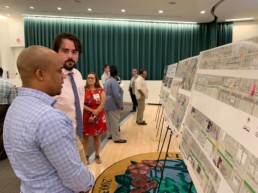Overview
The misuse and abuse of Alcohol, Tobacco and Other Drugs (ATOD) affect the health and well-being of millions of Americans. In addition to the direct impact on the individual and family, there are many factors related to ATOD that affect the community environment, as well as its norms and values. LHMG addresses these factors by focusing on the environmental influences that discourage ATOD use through policies, norms, and attitudes. In the environmental approach, ATOD problems are viewed as a community health issue, reflecting community norms and practices.
To better understand how ATOD impacts Miami Gardens, the ATOD Sub-Council in 2019-2020 worked with research partners over a period of 18 months to identify policy changes that can reduce the public health and safety consequences associated with the sale and consumption of high-risk alcohol products in the city. The ATOD Sub-Council spearheaded the research, in partnership with the Resource Room, the Florida Department of Health, the Florida Division of Alcoholic Beverages and Tobacco, the Miami Dade NAACP Youth Council, Miami Gardens Police Department, St. Thomas University, and others.
Together, the partners assessed the sales, products, and operational practices of alcohol sales outlets in Miami Gardens, mapped the police activity occurring around all outlets, and conducted face-to-face interviews with 40 retailers and residents. In Florida, alcohol retail outlets fall in two distinct categories (off-premise and on-premise). The partner’s research focused on off-premise outlets, which sell alcohol for consumption off-premises. This group includes liquor stores, grocery stores, convenience stores, gas stations and drug stores.
Alcohol sales to minors, illegal after-hours alcohol sales, and the high number of police calls for service to alcohol retail outlets and the areas surrounding them, and the impacts on youth and neighborhoods are among the chief concerns of residents and law enforcement officials about the operating practices of alcohol retailers in Miami Gardens. Contributing to these concerns is the fact that the alcohol industry has long been known to target communities of color with hyper-concentrated marketing and sales of high-risk alcohol products such as alcopops, malt liquor and fortified wine. In addition, studies consistently find that African American youth are exposed to far more alcohol advertising than other youth while African American communities are targeted for the sale of cheap high-risk high alcohol content products at greater rates than non-communities of color.

The alcohol retail landscape in Miami Gardens exhibits the same trends. Community-led compliance checks found that two-thirds of Miami Gardens alcohol retail outlets visited by decoy shoppers were non-compliant with local and state laws.
To combat these conditions in Miami Gardens, LHMG stakeholders approved and have been implementing a number of evidence-based strategies focused on policies and protective factors aimed at discouraging the including: Use of ATOD through overarching policy, systems, and built-environment and advocacy changes; Over consumption of alcohol among adults and all consumption for underage youth in Miami Gardens; Use of tobacco for underage youth in Miami Gardens; Misuse of prescription drugs in Miami Gardens; and Selling, distribution, and use of illicit drugs in Miami Gardens.
Strategies
- Develop, implement and enforce City policies that restrict ATOD product placement, marketing and promotion of alcoholic beverages and tobacco products at local convenience stores and gas stations in Miami Gardens.
- Work with the City of Miami Gardens to strengthen and enforce existing ATOD Laws and Codes.
- Develop, train and empower youth (ages 12-17) to advocate for policy change that reduces ATOD use among teens through the implementation of Student Working Against Tobacco (SWAT) and other evidence-based programs.
- Develop, train and empower community advocates for legal enforcement of ATOD regulations through Underage Drinking Reduction Strategies (UDRS).

ATOD Policy Project
The ATOD Policy Project works on strengthening enforcement policies, protocols, and practices in partnership with law and code enforcement to mitigate underage alcohol and tobacco sales at “high-risk” convenience stores in Miami Gardens. The project have developed an Alcohol Policy Agenda; conducted research to better under how alcohol, tobacco and other drugs impact the community of Miami Gardens; developed Protocols and Ordinance to address to retail alcohol environment in Miami Gardens; and completed the ATOD Data Book which offers a snapshot of the Alcohol Retail Environment in the City of Miami Gardens and features the findings of Phase I of LHMG’s ATOD Sub-Council’s research efforts, which engaged subject matter experts and research partners to gather quantitative and qualitative data on the practices of Miami Gardens alcohol retailers. The Data Book illustrates the alcohol retail landscape in Miami Gardens exhibits many of the same trends that pervade communities of color across the nation. As a next step, the project will be taking a set of policy recommendations to City Council to strengthen policies governing the sale and marketing of alcoholic products in the City.
SWAT
SWAT (Students Against Tobacco) is a statewide youth organization working to mobilize, educate and equip Florida youth to revolt against and de-glamorize Big Tobacco. SWAT works to change the social norms associated with tobacco and change the way people think about tobacco, making it less desirable, less acceptable and less accessible. In partnership with Florida Dept. of Health, LHMG have implemented SWAT Clubs in two local Miami Gardens schools and 1 community based organization to train student as advocates for policy change to reduce ATOD use among teens. The project’s goal is to implement a SWAT Club at all middle and high schools in the City.
Accomplishments to Date
- Conducted a policy scan and identified policy opportunities to strengthen the City’s ability to restrict the point-of-sale marketing of alcohol and alcohol sales in high-risk areas and times.
- Developed Protocols and Ordinance to address to retail alcohol environment in Miami Gardens.
- Successfully implemented SWAT (Students Against Tobacco) Clubs in two local Miami Gardens schools and 1 community based organization to train student as advocates for policy change to reduce ATOD use among teens. SWAT is a statewide youth organization working to mobilize, educate and equip Florida youth to revolt against and de-glamorize Big Tobacco. SWAT works to change the social norms associated with tobacco and change the way people think about tobacco, making it less desirable, less acceptable and less accessible.
- Launched a project in 2018 to develop policy targets aimed at strengthening and enforcing existing ATOD Laws and Codes.
- Trained 20 students in Lead and Seed, an intervention for middle and high school youth designed to increase their knowledge and problem-solving skills for preventing and reducing ATOD use, guide them in developing strategic plans for use in their schools and communities, and help them implement those plans.
- Built the capacity of four (4) organizations in Photovoice, a methodology that offers a unique opportunity to document tobacco marketing, promotion, and impact across the community and use photographs and associated narrative as a resource to educate the public and affect policy, perception, systems and environmental change. The organizations are: City of Miami Gardens, The Resource Room, Gang Alternative, Miami Gardens Substance Abuse Coalition.
- Completed a Data Book on the Alcohol Retail Environment in the City of Miami Gardens, reflecting the quantitative and qualitative data on the practices of alcohol retailers in the City of Miami Gardens. The Data Book illustrates how the alcohol retail landscape in the City exhibits many of the same trends that pervade communities of color across the nation and lay out a set of recommendations on how to strengthen policies governing the sale and marketing of alcoholic products in the City.